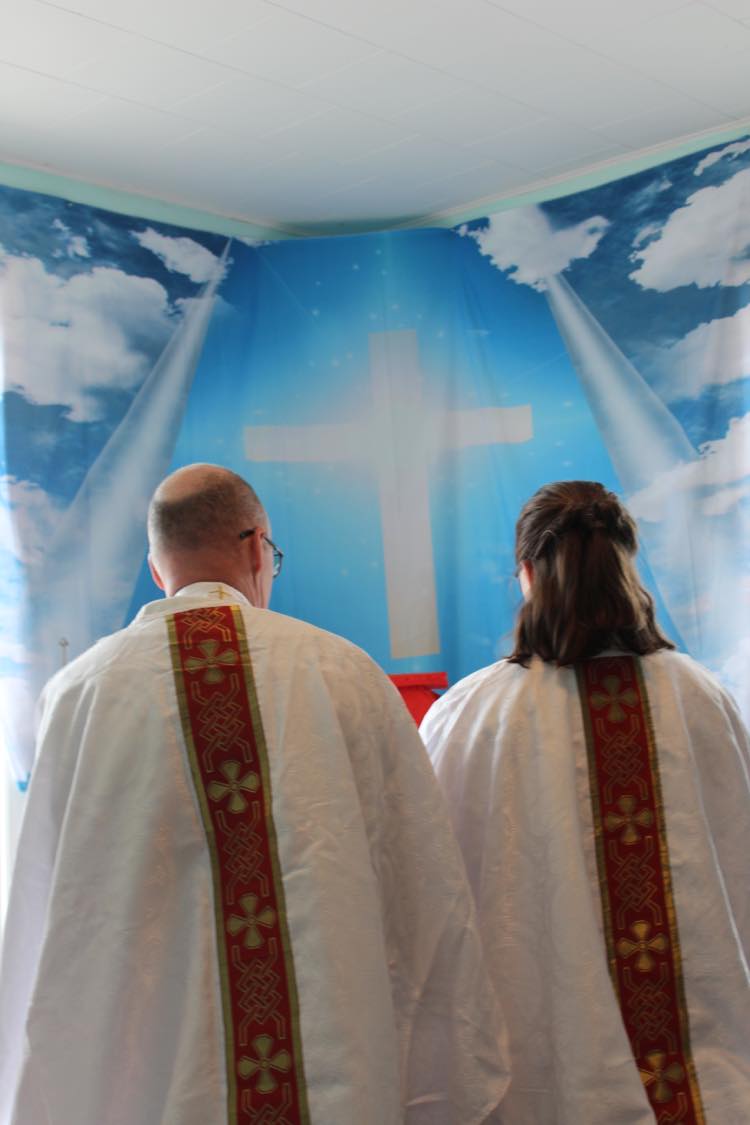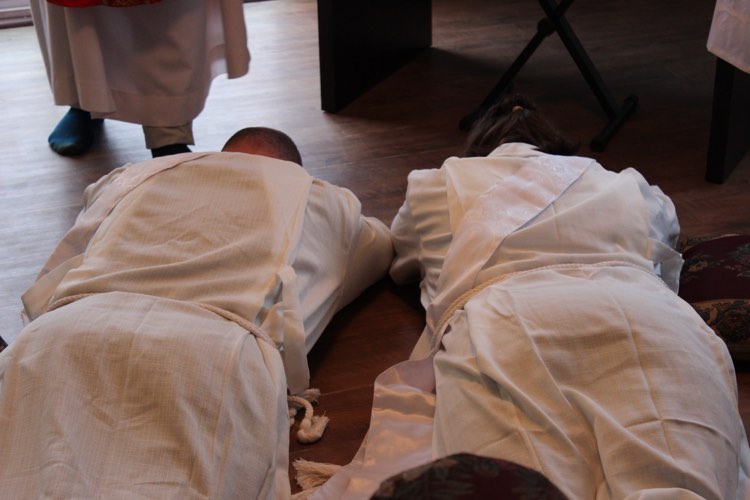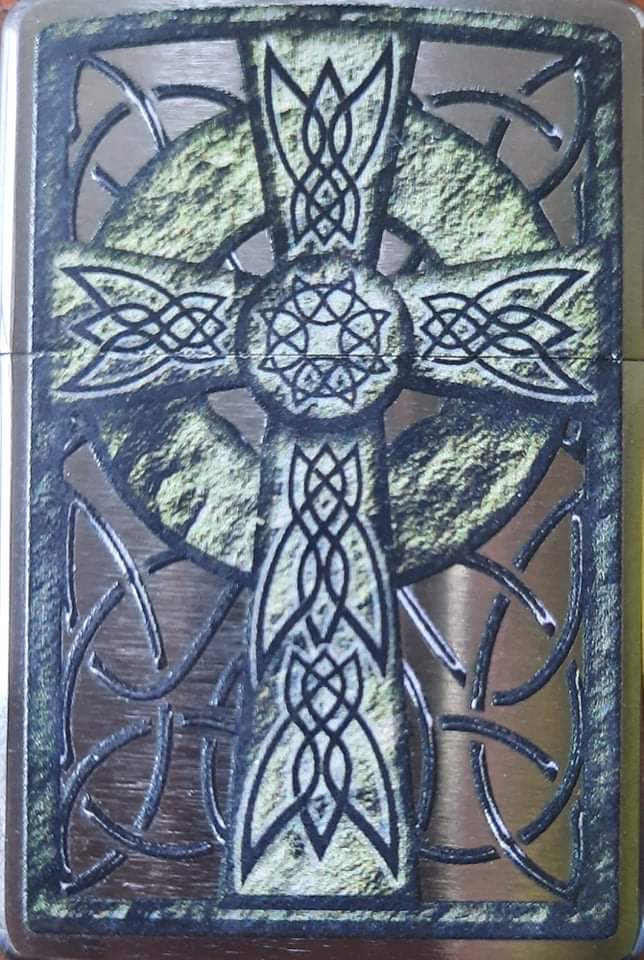- Home
- Seminary Studies
- Catholic Doctrine
Simply Catholic and Welcoming You
Catholic Doctrine
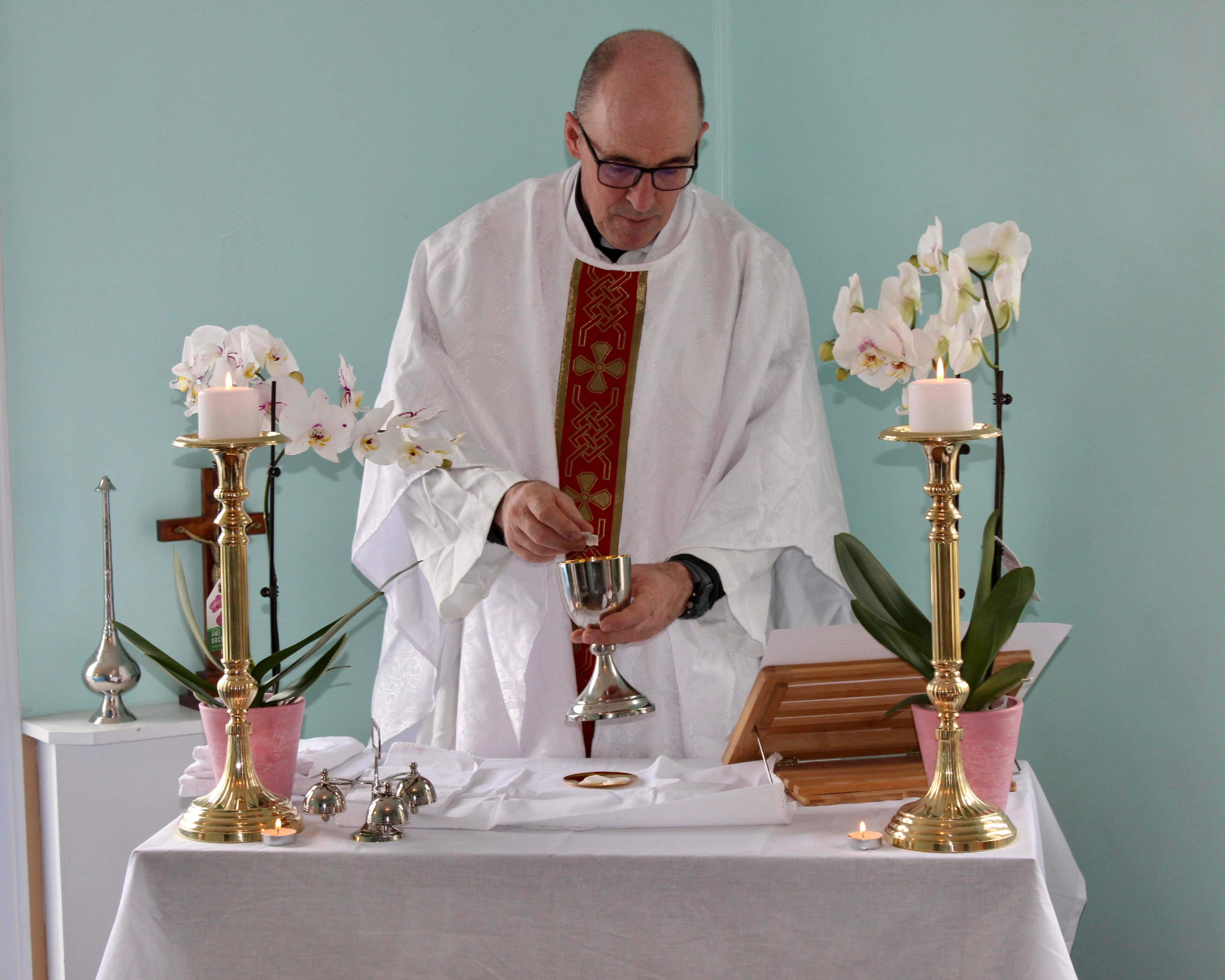
Fr. Philip Saying Mass
Catholic doctrine encompasses the core beliefs and teachings of the Catholic Church. It is rooted in scripture, tradition, and the teachings of the Church's Magisterium (the teaching authority).
These doctrines cover a wide range of topics, including the nature of God, the divinity of Jesus, the role of the Holy Spirit, the sacraments, the role of the Church, the afterlife and more.
Key Areas of Catholic Doctrine
The Trinity - The Nature of God
As Catholics we believe in one God who exists in three co-equal persons: Father, Son (Jesus), and Holy Spirit. Each person is fully God, but they are distinct in their roles and actions.
Jesus Christ- Divinity and Humanity
Jesus is believed to be both fully God and fully human (the Incarnation), the Son of God who came to save humanity. Catholics believe in his passion, death, and resurrection, which are central to our faith.
The Role of the Holy Spirit
In Catholic doctrine, the Holy Spirit is a divine person of the Trinity, alongside the Father and the Son (Jesus). The Holy Spirit is believed to be the source of God's love and life, and plays a crucial role in salvation, sanctification, and the ongoing life of the Church.
It is the role of the Holy Spirit to create the fire of faith and love within us. Give us the grace we need in order to know Jesus Christ as our Lord and Savior and to know the Father as our Father. The Holy Spirit makes us who we are as Christians.
The Holy Spirit also has the unique role to revitalize and energize the church community with the Holy Spirit, encouraging growth in faith, love, and service. It involves growing a vibrant, active, and purposeful church that effectively fulfills its mission of sharing God's love and truth with the world. It does this through all of the Rites of the Church in our day and age.
The Holy Spirit's role in Catholic doctrine holds a broad spectrum as:
Source of Grace and Life
The Holy Spirit is the one who bestows God's grace, enabling believers to live a life of faith, hope, and love.
Teacher and Guide
The Holy Spirit guides believers in understanding God's will and leads them on the path of holiness.
Sanctification
Through the Holy Spirit, believers are transformed into the likeness of Christ, growing in virtue and holiness.
Animates the Church
The Holy Spirit is the source of the Church's life and mission, empowering it to proclaim the Gospel and serve the world.
Gift of Spiritual Gifts
The Holy Spirit bestows a variety of spiritual gifts on individuals and the Church, enabling them to serve and build up the Body of Christ.
The gifts of the Holy Spirit
The gifts of the Holy Spirit are supernatural gifts given by God to believers to help them live out their faith and serve others. While different Christian traditions may have slightly different lists, a common understanding includes seven primary gifts: wisdom, understanding, counsel, fortitude, knowledge, piety, and fear of the Lord. These gifts are meant to help believers grow in their relationship with God and be more effective in their lives.
Clarification:
Wisdom
The ability to discern God's will and apply it to life situations.
Understanding
The ability to grasp deeper truths and insights into God's character and plan.
Counsel
The ability to discern right from wrong and guide others in making wise decisions.
Courage
The ability to stand firm in the face of adversity and temptation.
Knowledge
The ability to understand God's Word and principles.
Reverence
The ability to love and respect God and to live in obedience to his will.
Fear of the Lord
A deep respect for God and a willingness to avoid sin.
These gifts are seen as ways for the Holy Spirit to work through believers, helping them to become more Christ-like and effectively share their faith with others. They are meant to be a source of strength and guidance, empowering believers to live a life that pleases God and is a positive influence in the world.
Examples of the Holy Spirit's work
Baptism
In baptism, the Holy Spirit is poured out, renewing and sanctifying the baptized.
Confirmation
The Holy Spirit empowers believers with further gifts of the Spirit
Mass
Through the Eucharist, the Holy Spirit makes present the sacrifice of Christ, nourishing believers' spiritual lives. It is not the priest who confects the Holy Eucharist rather it is the Holy Spirit that consecrates the bread and wine into the body and blood of Jesus through the priest.
Inspiration and Guidance
The Holy Spirit can inspire individuals to understand the Scriptures, make wise decisions, and live a life of holiness.
The Fruits of the Spirit
The Holy Spirit produces qualities like love, joy, peace, patience, kindness, goodness, faithfulness, gentleness, and self-control in the lives of believers.
In essence, the Holy Spirit is the active presence of God in the world, working to draw people to Christ, sanctify them, and build up the Church.
Catholic Doctrine Beyond the Trinity
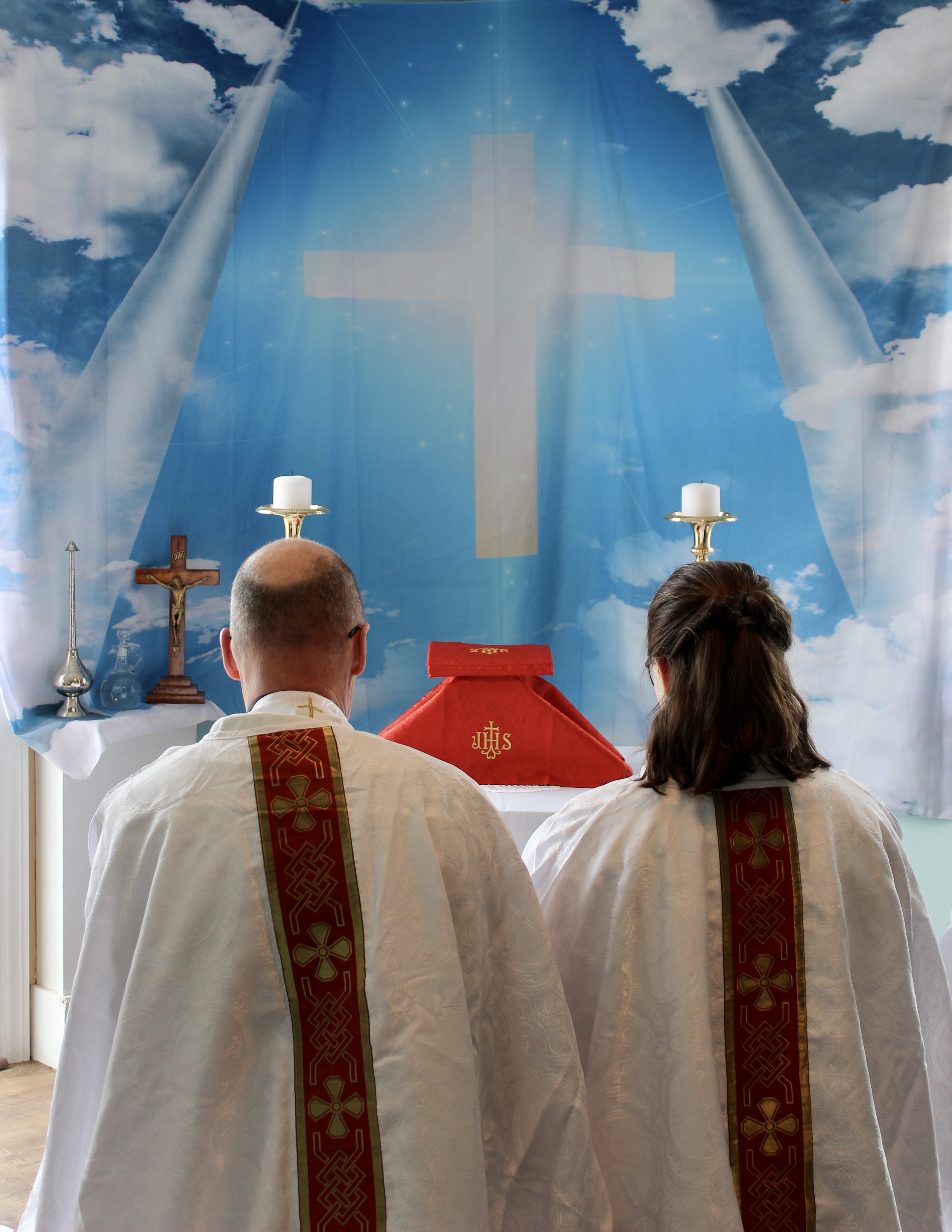
Fr. Philip and Amma Charlene Kneel Before an Altar
Having now spoken on the nature of God, the Divinity of Jesus and given some details on the Holy Spirit let's now look at other matters of Catholic doctrine.
The Church
The Catholic Church believes it is the one, holy, catholic, and apostolic Church founded by Jesus Christ. For Roman Catholics, the pope is seen as the successor to St. Peter, the first apostle, and the bishops are seen as successors to the apostles.
Other Catholic Rites (Churches) do not recognize the concepts of Papal Supremacy or Papal Infallibility. The non Roman/Latin Rite Catholics instead maintain their tradition of being presided over by a College (Council) of Bishops. We all see the Pope as simply ‘First among equals’ much as the ‘Patriarchs’ or ‘Metropolitan Bishops’ who lead other Catholic Rites.
Sacraments
Catholicism recognizes seven sacraments as outward signs of inward grace, including Baptism, Confirmation, the Eucharist, Reconciliation (Penance), Anointing of the Sick, Holy Orders, and Marriage.
Mary, the Mother of Jesus
Catholics hold Mary, the mother of Jesus in high regard, seeing her as:
Theotokos: Mary is the Mother of God
Believing in her Immaculate Conception (she was conceived without original sin)
Perpetual Virginity (Mary was a virgin before, during, and after the birth of Jesus)
Assumption into heaven (Dormition: Mary was taken body and soul into heaven)
Co-redemptrix, Mediatrix, and Advocate: Mary plays a unique role in redemption.
Scripture and Tradition
The Bible is considered God's inspired word, but the Catholic Church also recognizes the importance of tradition (the teachings and practices passed down through the Church) in understanding and interpreting scripture.
The Last Judgement
Catholics believe in a final judgment at the end of time when all will be judged by God and their eternal fate determined.
The core beliefs of the Catholic faith are found in the Apostolic Creed and the Nicene Creed. The Nicene Creed is a Christian statement of faith widely used in liturgical worship, particularly in Roman Catholic, Eastern Orthodox, Anglican, and major Protestant churches. It's considered an ecumenical creed, meaning it is accepted as authoritative across these diverse Christian traditions. The creed was initially formulated at the First Council of Nicaea in 325 and later revised and expanded by the First Council of Constantinople in 381.
The Nicene Creed
We believe in one God, the Father, the Almighty, Maker of heaven and earth, of all that is seen and unseen. We believe in one Lord Jesus Christ, the only Son of God, eternally begotten of the Father; God from God, Light from Light, true God from true God; begotten not made, one in being with the Father. Through Him all things were made. For us men and for our salvation He came down from heaven. By the power of the Holy Spirit He was born of the Virgin Mary and became man. For our sake He was crucified under Pontius Pilate. He suffered, died, and was buried. On the third day He rose again, in fulfillment of the Scriptures. He ascended into heaven and is seated at the right hand of the Father. He will come again in glory to judge the living and the dead, and His kingdom will have no end. We believe in the Holy Spirit, the Lord, the Giver of life, who proceeds from the Father and the Son. With the Father and the Son He is worshiped and glorified. He has spoken through the prophets. We believe in one, holy, catholic, and apostolic Church. We acknowledge one baptism for the forgiveness of sins. We look for the resurrection of the dead and the life of the world to come. Amen.
Recent Articles
-
Catholic-Confession
Apr 19, 25 08:53 PM
Full breakdown of the Catholic Confession Sacrament of Reconciliation -
Ordination, incardination and dismissal of clergy
Mar 03, 25 06:47 PM
Overview of Ordination to Holy Orders, incardination and dismissal of clergy -
Catholic Last Rites
Mar 03, 25 06:41 PM
An explanation of the Catholic Last Rites and Anointing of the Sick
